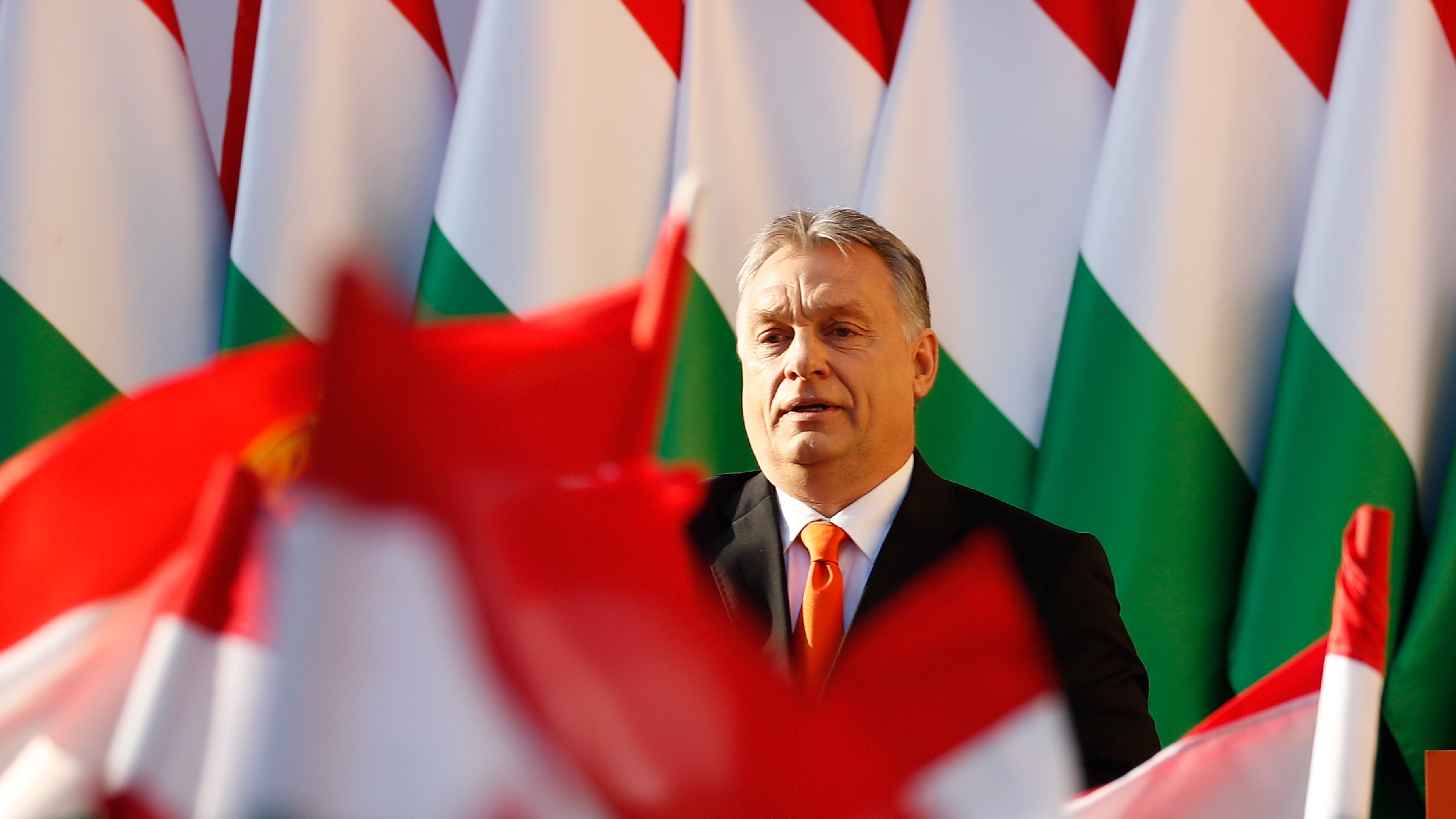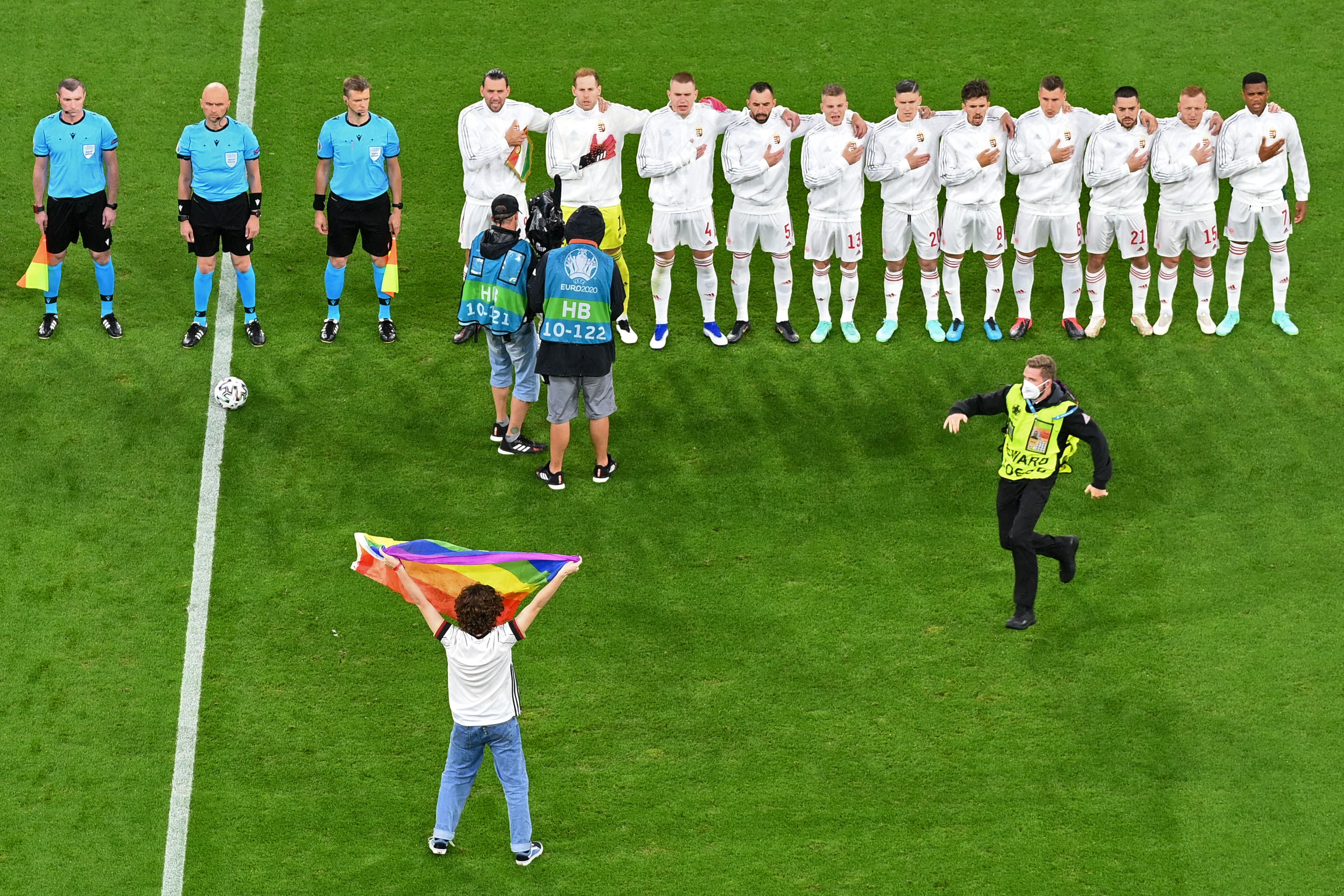How Viktor Orban’s anti-LGBTQ+ laws made the EU more hawkish on Hungary
European leaders vow to bring the nation ‘to its knees’ over civil rights crackdown

A free daily email with the biggest news stories of the day – and the best features from TheWeek.com
You are now subscribed
Your newsletter sign-up was successful
Hungarian Prime Minister Viktor Orban has been warned to either respect the rights of LGBTQ+ people in his country or face being forced out of the EU.
Multiple sources told Reuters that Orban was “confronted” at an EU summit last week, in “the most intense personal clash among the bloc’s leaders in years”.
Activists and political commentators have long warned of a democratic backslide in Hungary, which Orban has ruled since 2010. The EU has previously come under fire for failing to bring his government to heel, but anger in the bloc has finally bubbled over after Hungary’s parliament passed a law banning gay people from featuring in school educational materials or TV shows for under-18s.
The Week
Escape your echo chamber. Get the facts behind the news, plus analysis from multiple perspectives.

Sign up for The Week's Free Newsletters
From our morning news briefing to a weekly Good News Newsletter, get the best of The Week delivered directly to your inbox.
From our morning news briefing to a weekly Good News Newsletter, get the best of The Week delivered directly to your inbox.
Dutch Prime Minister Mark Rutte told reporters at the summit in Brussels that Orban had “has no business being in the European Union any more” - and that “the long-term aim is to bring Hungary to its knees on this issue”.
LGBTQ+ crackdown
Orban is gearing up to take on Budapest’s left-wing mayor Gergely Karacsony in an election next year that is widely viewed as an opportunity to wrestle control of Hungary away from right-wing authoritarianism. Karacsony is leading a coalition of six opposition parties that have united in a bid to defeat the nationalist PM.
As Orban battles for political survival, he has become increasingly “conservative and combative in promoting what he says are traditional Catholic values under pressure from the liberal West”, Reuters reports, and has introduced “restrictive policies” targeting the media, judges, academics and migrants.
A free daily email with the biggest news stories of the day – and the best features from TheWeek.com
Members of Orban’s government claim the bill that finally tipped the EU into action is designed to “combat child sexual abuse” by prohibiting the “sharing content with minors that is deemed to be promoting gay sex or sexual reassignment”, says The Washington Post.
But “critics argue it is far more than that”, the paper continues, and have accused Hungary’s “conservative faction” of limiting LGBTQ+ rights in order to “distract from the weakness” of Orban’s Covid-19 pandemic response.
The legislation bans gay people from being shown in educational materials, on prime-time television, and in shows and films aimed at children.
Outrage over the law extends well beyond Brussels, triggering a rainbow-coloured protest at a Germany-Hungary Euro 2020 football match in Munich last week.

Uefa had vetoed plans to light the Allianz Arena, which was hosting the match, in rainbow colours in support of LGBTQ+ rights, arguing that the move would contravene the football governing body’s rules about political and religious neutrality. However, the German team wore rainbow armbands and a protestor waving an rainbow flag invaded the pitch during the Hungarian national anthem.
Orban has responded to the criticism by claiming to have fought for LGBTQ+ rights as both a politician and as an activist in an anti-communist student movement in the late 1980s. “I am a fighter for their rights,” he told reporters prior to last week’s summit meeting.
“I am a freedom fighter in the communist regime. Homosexuality was punished and I fought for their freedom and their rights. I am defending the rights of the homosexual guys, but this law is not about that.
“The law is about deciding what kind of way parents would like to sexually educate the kids.”
Despite that claim, the legislation has “added a new wrinkle to Hungary’s already tense relationship with” the EU, says The Washington Post.
Dutch PM Rutte, Emmanuel Macron and Angela Merkel are among 17 EU leaders who have signed a joint letter that while not mentioning Hungary explicitly, contains a vow to fight discrimination against members of Europe's LGBTQ+ community.
And European Commission President Ursula von der Leyen has instructed her team to send the Hungarian government a letter “to express our legal concerns before the bill enters into force”.
Von der Leyen told reporters that the bill was a “a shame” and “clearly discriminates against people on the basis of their sexual orientation”.
“I strongly believe in an EU where you are free to love whom you want,” she added.
The Hungarian government was quick to fire back, however, publishing a statement hours later describing the Commission’s intervention as “a shame, because it is based on false allegations” and “publishes a biased political opinion without a previously conducted, impartial inquiry”.
Delayed backlash
The EU has previously faced intense scrutiny and criticism for failing to push back against Orban’s brand of right-wing populism.
The Hungarian PM is deeply reliant on subsidiaries from the bloc, with The New York Times claiming following a 2019 investigation that he used “EU money” to maintain “a patronage system that enriches his friends and family, protects his political interests and punishes his rivals”.
His government has “auctioned off thousands of acres of state land to his family members and close associates”, according to the paper, and “those who control the land, in turn, qualify for millions in subsidies from the EU”.
But following his decision to so explicitly target Hungary’s LGBTQ+ community, the flow of cash to Hungary may soon dry up.
Xavier Bettel, Luxembourg’s openly gay PM, was among the EU leaders who confronted Orban at the summit meeting. Prior to the clash, Bettel told reporters that he would be “intolerant today with intolerant people”, adding that if Orban really believed that “watching a film or speaking in a classroom about sexual orientation makes you gay, he really doesn't understand anything”.
French leader Macron has also condemned the legislation, saying it “is not in line with our values and what Europe is”, while the Netherlands' Rutte delivered the most striking attack on Orban, telling reporters that Hungary “must leave” the EU or repeal the law.
Orban has “clashed” with Brussels and EU leaders many times in the past decade over allegations that he has been slowly “undermining judicial independence” and “fanning the flames of anti-Semitism, Islamophobia, homophobia and anti-Roma sentiment”, Politico reports.
So far, he “has brushed off the allegations and suffered few consequences”, the news site continues. But the “battle over LGBTQ+ rights appears to have touched a nerve with many other EU leaders and suggests their patience with Orban is wearing thin”.
“I used to have respect for Mr Orban,” Luxembourg’s Bettel said before the heated summit. But “Europe is not just about laws and subsidies, it’s also about rights and obligations”.
Joe Evans is the world news editor at TheWeek.co.uk. He joined the team in 2019 and held roles including deputy news editor and acting news editor before moving into his current position in early 2021. He is a regular panellist on The Week Unwrapped podcast, discussing politics and foreign affairs.
Before joining The Week, he worked as a freelance journalist covering the UK and Ireland for German newspapers and magazines. A series of features on Brexit and the Irish border got him nominated for the Hostwriter Prize in 2019. Prior to settling down in London, he lived and worked in Cambodia, where he ran communications for a non-governmental organisation and worked as a journalist covering Southeast Asia. He has a master’s degree in journalism from City, University of London, and before that studied English Literature at the University of Manchester.
-
 The Olympic timekeepers keeping the Games on track
The Olympic timekeepers keeping the Games on trackUnder the Radar Swiss watchmaking giant Omega has been at the finish line of every Olympic Games for nearly 100 years
-
 Will increasing tensions with Iran boil over into war?
Will increasing tensions with Iran boil over into war?Today’s Big Question President Donald Trump has recently been threatening the country
-
 Corruption: The spy sheikh and the president
Corruption: The spy sheikh and the presidentFeature Trump is at the center of another scandal
-
 Rubio boosts Orbán ahead of Hungary election
Rubio boosts Orbán ahead of Hungary electionSpeed Read Far-right nationalist Prime Minister Viktor Orbán is facing a tough re-election fight after many years in power
-
 Epstein files topple law CEO, roil UK government
Epstein files topple law CEO, roil UK governmentSpeed Read Peter Mandelson, Britain’s former ambassador to the US, is caught up in the scandal
-
 Iran and US prepare to meet after skirmishes
Iran and US prepare to meet after skirmishesSpeed Read The incident comes amid heightened tensions in the Middle East
-
 Grok in the crosshairs as EU launches deepfake porn probe
Grok in the crosshairs as EU launches deepfake porn probeIN THE SPOTLIGHT The European Union has officially begun investigating Elon Musk’s proprietary AI, as regulators zero in on Grok’s porn problem and its impact continent-wide
-
 Israel retrieves final hostage’s body from Gaza
Israel retrieves final hostage’s body from GazaSpeed Read The 24-year-old police officer was killed during the initial Hamas attack
-
 China’s Xi targets top general in growing purge
China’s Xi targets top general in growing purgeSpeed Read Zhang Youxia is being investigated over ‘grave violations’ of the law
-
 Panama and Canada are negotiating over a crucial copper mine
Panama and Canada are negotiating over a crucial copper mineIn the Spotlight Panama is set to make a final decision on the mine this summer
-
 Europe moves troops to Greenland as Trump fixates
Europe moves troops to Greenland as Trump fixatesSpeed Read Foreign ministers of Greenland and Denmark met at the White House yesterday